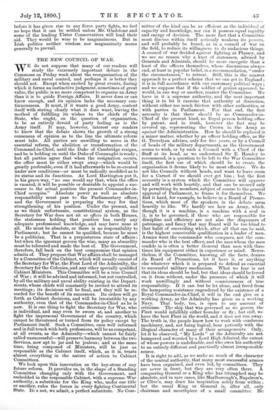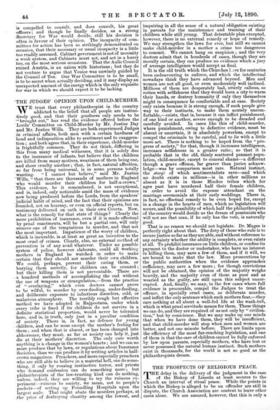THE NEW COUNCIL OF WAR.
WE do not suppose that many of our readers will study the extremely important debate in the Commons on Friday week about the reorganisation of the military and naval control, and perhaps it is better they should not. Except when excited by great events, during which it forms an instinctive judgment, sometimes of great value, the public is no more competent to organise an Army than it is to guide Foreign Affairs. It never does or can know enough, and its opinion lacks the necessary con- tinuousness. It must, if it wants a good Army, content itself with stating clearly what it does want, leaving the method of fulfilling its wishes to the chiefs of the State, who ought, on the question of organisation, to be as entirely devoid of party feeling as is the Army itself. It may, however, interest our readers to know that the debate shows the growth of a strong consensus of opinion as to the line the ultimate reform must take. All parties are unwilling to move in the essential reform, the abolition or transformation of the Command-in-Chief, until the Duke of Cambridge resigns, and he is holding on until the Duke of Connaught is ready ; but all parties agree that when the resignation occurs, the office must be either swept away—which would be greatly preferable, even if it had afterwards to be re-created under new conditions—or must be radically modified as to its status and its functions. As Lord Hartington put it, in his grave way, "no one would say that, when the office is vacated, it will be possible or desirable to appoint a suc- cessor to the actual position the present Commander-in- Chief occupies." Absolute power as well as absolute responsibility must pass to the Parliamentary officer, and the Government is preparing the way for that strengthening of his position. Under the present, and as we think unfortunate, constitutional system, as the Secretary for War does not sit ex officio in both Houses, the statesman holding that position has rarely any adequate professional knowledge, and may have none at all. He must be absolute, or there is no responsibility to Parliament ; but he cannot be qualified, because he must be a politician. That is a preposterous state of affairs ; but when the ignorant govern the wise, many an absurdity must be tolerated and made the best of. The Government, therefore, fall back on the best compromise that opinion admits of. They propose that War affairs shall be managed by a Committee of the Cabinet, which will usually consist of the Secretary for War, the First Lord of the Admiralty, the Secretary for the Colonies, and any other specially qualified Cabinet Ministers. This Committee will be a true Council of War ; it will be advised and informed, but not controlled, by all the military and naval ability existing in the Depart- ments, whose chiefs will constantly be invited to attend its meetings ; its decisions will be final, and they will be re- corded for the benefit of its successors. Its orders will go forth as Cabinet decisions, and will be irresistible by any authority, even that of the Commander-in-Chief as he is now. It is one thing to fight the Secretary for War, who is individual, and may even be sworn at, and another to fight the impersonal Government of the country, which cannot be threatened or turned from its policy except by Parliament itself. Such a. Committee, once well informed and in full touch with both professions, will be as competent, at all events, as the Admiralty—which cannot be fairly called unsuccessful—will preserve harmony between the two Services, now apt to jar and be jealous ; and at the same time, being composed of Ministers, will be just as responsible as the Cabinet itself, which, as it is, trusts almost everything in the nature of action to Cabinet Committees.
We look upon this innovation as the key-stone of any future reform. It provides us, in the shape of a Standing Committee changing only with the Government, and embedded in the responsible Cabinet, with a supreme War authority, a substitute for the King who, under one title or another, rules the forces in every fighting Continental State. Iti s not, we admit, a perfect substitute. No Com- mittee of the kind can be as efficient as the individual of capacity and knowledge, nor can it possess equal rapidity- and energy of decision. The mere fact that a Committee must discuss within itself seriously weakens its powers, and will probably be found, as in a council of war on the field, to reduce its willingness to do audacious things.. A council of war decided against fighting at Plassey, and we see no reason why a knot of statesmen, advised by Generals and Admirals, should be more energetic than a knot of the officers themselves, whose discussions always: end, at least in popular belief, in a recommendation, "under the circumstances," to retreat. Still, this is the nearest approach to a perfect scheme that we can get in England,. it is in full accordance with our customary political ways ; and we suppose that if the soldier of genius appeared, he would, in one way or another, master the Committee. We have in it a supreme authority, and the next important. thing is to let it exercise that authority at discretion, without either too much friction with other authorities, or with parties in Parliament. For that end, the first necessity is that there should be no Commander-in- Chief of the present kind, no Royal person holding office by patent, and in truth, however the fact may be covered up, representing the Crown in the Army as against the Administration. How he should be replaced is a minor matter, whether by an officer holding office, as Sir G. Trevelyan advises, only for five years, or by a Council of heads of the military departments, as the Government seems to wish, or by such a Council with a Chief of the- Staff at its head, as we understand Sir E. Hanley to recommend, is a question to be left to the War Committee itself, the first use of which should be to create the organisation it deems likely to be most effective. We do- not like Councils without heads, and want to leave room for a Carnet if we should ever get him ; but the first necessity is a system which the Committee will approve and will work with heartily, and that can be secured only by permitting its members, subject of course to the general approval of Parliament, to frame it for themselves. We- find it hard, for example, to believe in a Board of Promo- tions, which most of the speakers in the debate seeni heartily to like. We hardly see how an Army, which, though it is a machine, is a machine with a soul in it, is to be governed, if those who are responsible for discipline and efficiency are not also the dispensers of patronage, and fancy that any Board will be too blind ta that habit of succeeding which, after all that can be said, is the highest conceivable qualification in a leader of men.. Armies want the commander who conquers, not the com- mander who is the best officer, and the man whom the men confide in is often a better General than men with three times his equipment either in experience or mind. Never- theless, if the Committee, knowing all the facts, desires its Board of Promotions, let it have it, or anything else whatever which it is prepared to defend as essential to successful military mechanism. What we fear is not that its ideas should be bad, but that ideas should be forced on it from without, under the pressure of which it will work unwillingly and without consciousness of true responsibility. If it can but be let alone, and freed from the hampering resistance engendered by the existence of a Royal Commander-in-Chief, it will in the end give us a working Army, as the Admiralty has given us a working Navy. That body, too, is open to any amount of criticism. The ship that was governed as we govern the Fleet would infallibly either founder or fly ; but still, we• have the best Fleet in the world, and it does not run away.. The truth is, the people know how to work with cumbrous machinery, and, not being logical, bear patiently with the character of many of their arrangements. Only, let it be observed, "My Lords" at the Admiralty are not hampered and worried by a Lord High Admiral, the extent of whose powers is undefinable, and who owes his authority to an entirely different and practically almost irresponsible source.
It is right to add, as we make so much of the character of the central authority, that many most successful armiea have been organised, and even led, by committees. Thei are never in front, but they are very often there. conquering General or a Sing who has triumphed may be absolute, and in rare cases, like Marlborough's, Napoleon's, or Clive's, may draw his inspiration solely from within ;. but the usual King or General is, after all, only chairman and mouthpiece of a small committee. He is compelled to consult, and. does consult, his great officers ; and though he finally decides, as a strong -Secretary for War would decide, still his decision is often in favour of their opinion. The incapacity of com- mittees for action has been so strikingly demonstrated on occasion, that their necessary or usual incapacity is a little too readily assumed. Cabinet government is not of necessity a weak system, and Cabinets must act, and act in a hurry too, on the most serious occasions. That the Aulic Council ruined Austria, is an axiom with historians ; but they do not venture to argue that Venice was unwisely guided by the Council of Ten. Our War Committee is to be small, is to be secret when actually deciding, and. it may display an unexpected amount of the energy which is the only requisite for war in which we should expect it to be lacking.



































 Previous page
Previous page